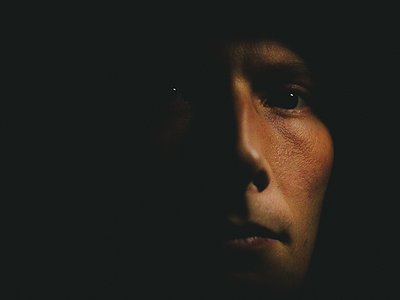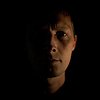Name: Lawrence English
Nationality: Australian
Occupation: Professional listener, chicken owner & general gentleman about town.
Bands & Projects: Me, Slow walkers, Holy Family, Tujiko Noriko Trio ... most anything fun.
Labels: Room40
Musical Recommendations: Scott Walker/Luc Ferrari
When did you start writing/producing music - and what or who were your early passions and influences?
My mid-teens was probably the first time I spent working on music or at least being interested in some meaningful way. I started a fanzine in high school and that pretty much started me down the dark path. Looking back on it, my interest in sound runs a bit deeper than that to a couple of childhood experiences, specifically one involving some bird-watching with my dad. This one bird, the reed warbler, had an incredible call like a malfunctioning synth almost, but it hid in clumps of reeds and was very difficult to spot. My father told me to close my eyes, to listen first and then open my eyes and look. Whilst I didn’t think about it at the time, that was probably the first moment I understood sound as spatial, something that contained a wealth of information and possibility for locating one's self.
What do you personally consider to be the incisive moments in your artistic work and/or career?
Hmmm, that’s a good question. I think a life, any life really, is actually something of an accumulation of moments more than a few large slabs of time. I guess it’s a little like a cloud, all the time there’s water vapour collecting and rising up, slowly over time the cloud takes shape, eventually it gets full and rains some, then the process starts over. The cloud is never actually set or static, it's always shifting form, but ultimately it can be understood as a cloud.
In some respect that is how I perceive my life making work. Processes and explorations in one aspect impact on another and sometimes the smallest things, like reading a book, watching a film, listening in a city or talking to a friend can result in fairly profound outcomes. I mean, an easy example for me to give is visiting David Toop, picking up a copy of The Peregrine from his desk and reading one random paragraph and then being completely struck by the work. That paragraph led me to make my record of the same name, and to buy about 100 copies of the book over the past half decade to give to people who I think might enjoy it. It brings me great pleasure to see people like Werner Herzog talking with as much passion about the book as I have, knowing I sent over that copy to him. So for me, it perhaps is about being present and being able to truly recognise those sometimes-incidental things that we come across which eventually shape who we become.
How would you describe and rate the music scene and sound potential of the city you are currently living in and how important is it for your own work?
I’ve lived in Brisbane, Australia for all my life. When I started Room40 and making work, it was a perfect place to live. Cheap, aspiring and the kind of place that offered people like me the chance to grow their interests, experiment and ultimately have the chance to create a place from which they could make good situations for exciting stuff to happen. Now, I’m not sure what to say of Brisbane or Australia more broadly. We are facing some worrying times, a government at both state and national levels that is driving the country into a way of being that subverts the core values of what has historically made Australia a good and welcoming place to live.
This latest record, Wilderness Of Mirrors, is in some respects a response to this situation that’s growing here. We see the reversion of a great many humanitarian concerns, we see unthinkable treatment of asylum seekers, uneducated responses to environmental change and a kind of hollow expression of ideology above and beyond anything we have previously experienced. This is happening elsewhere too around the world. The record bares some of the marks of my frustrations, it’s me yelling into what is becoming a large black void, wondering if anything echoes back from inside.
What are currently your main compositional- and production-challenges?
I think these are perhaps challenges that persist for any artist, how is it you can create work that is transcendent and meaningful for people? I’m always wanting to push ahead with what I do, try to create something that affects me and I hope some other minds.
How do you see the relationship between sound and composition?
That’s actually a question I’ve been giving a lot of thought to. I’ve been researching the act of listening over the past year, looking specifically at the philosophical ways in which we have come to understand that act. I think Christoph Cox summarises sound very well in recognising it as this flux that precedes and exceeds us as both ears tapping into the flux and also contributing to it. In some respects the idea of composition is an innate act of any listener. We compose how it is we listen to the spaces around us. What we filter, what we focus on, each of these decisions, conscious or otherwise create a compositional listening. So for me this relationship is an ultimately personal one which may be as rich or monotone as the listener wants.
What do you usually start with when working on a new piece?
Quite honestly an idea or thought, I relish something to respond to. I find much of my work is process driven, it can start with something very far removed from music, in the instance of the new LP Wilderness Of Mirrors, with me reading around the history of that phrase. From that, an entire process was born, which led to the record. I do of course find myself just experimenting and often come across elements or sounds that spark entire chains of events, but ultimately I find that process of dwelling deeply on an idea something pretty powerful to work from.
How do you see the relationship between location and sound and how do you select your locations or objects of interest?
I think this very much varies on the project. Something like the site listening project, that’s quite opportunistic in a sense. It’s about those incidental spaces or unusual environments that we might pass by, but not lend focus to. Other times it's very much coming out of a focus, for example my trips to the outback or Antarctica or the Amazon were all very much focused projects and often involved a good amount of research ahead of time.
What will influence your decisions on how or how much to edit the material captured in the field? Without any prior information on field recordings, listeners may sometimes find it hard to determine their precise origin and context. Depending on one's perspective, this may be desirable or problematic. Where do you stand on this? Do you feel that, as part of your work, music needs to be explained or should it retain its “inexplicable nature”?
I think this is one of the tensions that lies at the core of a great deal of writing around sound presently. Francisco Lopez lies at one end of that spectrum, his outstanding work and advocacy for a very stringent application of Pierre Schaefer’s acousmatic listening and at the other end, Seth Kim Cohen’s writing around non-cochlear readings of sound arts in his excellent book ‘In The Blink Of An Ear’. I’d like to think I position myself somewhere between these two fields, and in fact I don't think it’s impossible to create some connective tissue between the two ends of the spectrum.
For me, acousmatic listening could be read as a provocation to listeners to develop a kind of heightened awareness of how they listen. It also could be read as a way of saying, open your ears, recognise them as profound tools for not just extraction of signal but a richness that goes beyond the functional nature of how we usually listen. At the same time as aspiring to this rich listening, we must recognise that when we listen, each of us does so subjectively, not just in a physiological way, but also in a socio-cultural way. When we listen we bring all of our experiences to that listening. So often in concerts, when I have used field recordings people will come up and say, ‘wow, that recording of the boat in the sea being thrown around was amazing’ or ‘that sound was just like this time I was a kid at my grandmother’s beach house and we had a hurricane’, the fact I know the record is from an abandoned airfield in Patagonia doesn’t make a difference to how these people hear it. Sound finds its own narratives inside us. That’s what makes it so powerful. It is invitational, it is open to multiple readings and possible explanations.
Usually, it is considered that it is the job of the composer to win over an audience. But listening is also an active, rather than just a passive process. How do you see the role of the listener in the musical communication process?
I guess building on what I said above, I agree that listening, if it’s to be affecting, is a participatory act. Beyond what I said above, where this becomes interesting, is in the live context of performance where there’s the other ear, the ear of the body active in the experience. I think that listening, the physical kind where the body vibrates, can be really something. I know for me that was part of what inspired sections of the new album. Hearing bands like SWANS, Earth, Xiu Xiu and My Bloody Valentine during the making of Wilderness Of Mirrors really got me thinking about how it is you can affect the body with sound and equally how our ears behave when they are met with such an overwhelming sound pressure level. I’ve been fascinated for a long time with how harmonic distortion replicates some of that feeling you get listening to incredibly loud music. As if your ears are giving way under the weight of the sound.
What, from your point of view, can the sound – rather than, say, its visual appearance - of a particular location or of a particular recording object tell us about its nature? Or, to put it differently, in which way can listening to field recordings change our perception of the world?
Well in some very simple ways, at the most basic level it reveals to us sound spaces or environments we have not come in contact with. I am ceaselessly amazed by the incidental sounds that appear in urban and natural settings; listening to sounds that have deeply, in a primitive way, affected me, made the hairs on my neck stand up. This primal effect can sometimes be experienced when listening to field recordings. That which lies beyond our comprehension, a bird call, an animal whimpering, a mountain whispering as wind licks its edges, this is the stuff that has fuelled our mythologies and I suppose our fear of the dark … when our eyes fail us our ears open out new possibilities for understanding and sometimes they’re frightening. Almost always they’re fascinating.



